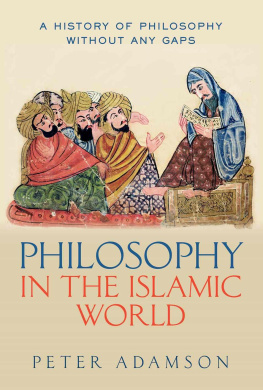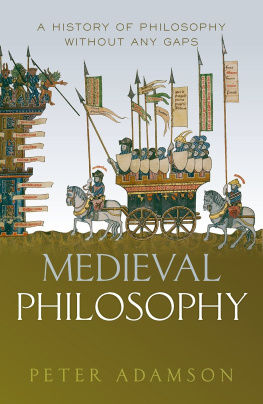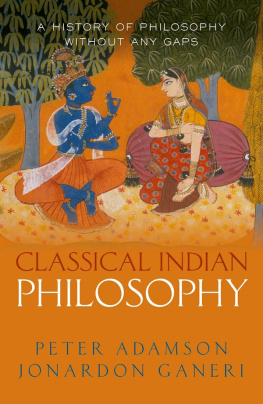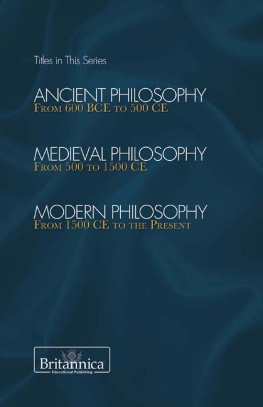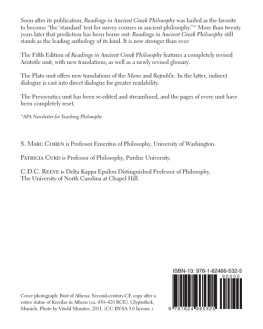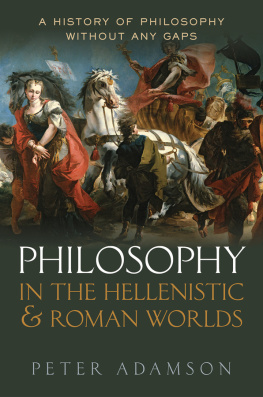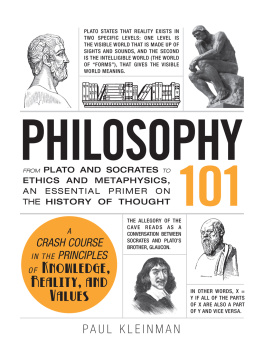CLASSICAL PHILOSOPHY
CLASSICAL PHILOSOPHY
a history of philosophy without any gaps volume 1
PETER ADAMSON


Great Clarendon Street, Oxford, OX2 6DP,
United Kingdom
Oxford University Press is a department of the University of Oxford.
It furthers the Universitys objective of excellence in research, scholarship,
and education by publishing worldwide. Oxford is a registered trade mark of
Oxford University Press in the UK and in certain other countries
Peter Adamson 2014
The moral rights of the author have been asserted
First Edition published in 2014
Impression: 1
All rights reserved. No part of this publication may be reproduced, stored in a retrieval system, or transmitted, in any form or by any means, without the prior permission in writing of Oxford University Press, or as expressly permitted by law, by licence, or under terms agreed with the appropriate reprographics rights organization. Enquiries concerning reproduction outside the scope of the above should be sent to the Rights Department, Oxford University Press, at the address above
You must not circulate this work in any other form and you must impose this same condition on any acquirer
Published in the United States of America by Oxford University Press
198 Madison Avenue, New York, NY 10016, United States of America
British Library Cataloguing in Publication Data
Data available
Library of Congress Control Number: 2013956024
ISBN 9780199674534
Printed in Italy by
L.E.G.O. S.p.A.Lavis TN
Links to third party websites are provided by Oxford in good faith and for information only. Oxford disclaims any responsibility for the materials contained in any third party website referenced in this work.
For Johanna and Sophia
CONTENTS
I wrote this book because my back hurt. Well, not only for that reason, obviously. But back-pain did make a significant contribution. It led to me trying to get in shape, by taking up running. The thing about running, especially running every day through the same neighborhood (or if you live in London, as I did then, neighbourhood), is that it gets boring. Seeking a diversion, I discovered podcasts. These are basically radio shows you can download from the internet, and they make for an excellent distraction while exercising. Being a bit of a philosophy buff, as you might already have suspected, I started listening to several fine podcasts on this subject. But it struck me that there was no podcast series that covered philosophy from a historical angle, telling the story of philosophy in chronological order the way other podcasts had tackled topics like ancient Rome. Since I am a historian of philosophy, it seemed to me that such a series would be a good thing. It would form a continuous narrative, and it would leave nothing out. It would cover the story of philosophy starting at the beginning, and, to steal a phrase from my esteemed colleague Richard Sorabji, without any gaps.
And the rest is, in several senses of the word, history. The podcast launched in the autumn of 2010 and is still going strong, having covered all of ancient philosophy and now the philosophical tradition of the Islamic world. Although the podcast version includes episodes with experts on various topics, the core of the series has been a series of scripts. The scripts on classical philosophy form the basis of the book you are holding in your hands, revised for this new format. It is the first of several planned volumes which will offer a continuous history of philosophy, which will be distinctive in paying attention to less commonly explored figures and movements. In this volume I cover several topics you wouldnt expect to encounter even if you studied philosophy intensely at university level: some of Platos less popular dialogues, for instance, and the Hippocratic corpus. This will be even more obvious in the next volume, when I will look at relatively obscure movements in Hellenistic philosophy like the Cyrenaics. I hope that Ive managed not just to include these minor topics but to make them accessible for a broad readership, and show their historical and philosophical interest. My goal in this series of books, then, is to tell the whole history of philosophy, in an entertaining but not oversimplified way.
We philosophers like to define our terms before we begin, so let me start by explaining what I mean when I talk about the whole history of philosophy. Lets start with the word whole. Ultimately my hope is that the series will deal not only with Western philosophy (to use a designation I dont particularly like) but also the philosophical traditions of India and China. As already mentioned, philosophy in the Islamic world, a subject dear to my own heart, will also be covered. But of course, dealing with any of these traditions without any gaps is doomed to remain more an aspiration than a promise. Some readers may occasionally feel that Ive left out a figure or an idea deserving of mention or even lengthy discussion. The point of the without any gaps approach is more to avoid skipping from highlight to highlight, the way a lot of university courses on history of philosophy have to dowhere one jumps straight from, say, Aristotle to Descartes, vaulting over a gap of two thousand years or so. Rather, I want to show how each thinker built on those who came earlier, while also striking out in new directions.
That brings me to the word history. Obviously the history of philosophy isnt quite like other areas of history. It is not mostly about events, when and why they happened, and which important people were involved. Nor is it the sort of history that paints a picture of another time, maybe by focusing on people who werent so importantpeasants instead of potentates. On the other hand, the historian of philosophy cant ignore these things. Were going to see that political, social, and religious forces had a lot to do with the way philosophy progressed, and even the fact that philosophy could happen at all. Its an obvious, but easily overlooked, fact: philosophy occurs only in a society that can produce philosophers. Usually this has meant that philosophy happened in close proximity to wealth and power. Its naive to think that philosophy can be practiced, and preserved, without some degree of economic and political stability and support. Yet its cynical to think that philosophy is never anything more than an expression of political and economic power.
For the period well be studying in this volume, historical forces didnt only help to determine who the philosophers were and what they thought. They also determined whether and how their ideas reached us. For most of the time between the ancient Greeks and ourselves, it was extremely laborious, and therefore expensive, to transmit philosophical writings: they had to be copied by hand. We know about Greek ancient philosophy only thanks to manuscripts written in the medieval perioda manuscript being, as the word literally says, a text that is handwritten. In order for us to read the earliest works of philosophy from the Western tradition, texts needed to be copied and re-copied over many generations. Even this process has given us only indirect access to the ideas put forward in the sixth century BC, by a man who has some claim to be the first philosopher and is at any rate going to be the first thinker covered in this volume: Thales of Miletus.
But before we get to him, a few remarks about the last word in the title history of philosophy. (Im assuming you will have no trouble with the word of.) The question of what philosophy is, is of course itself a philosophical question. It is a question that has been answered differently in different ages. As well be seeing, the ancient understanding of philosophy was rather more broad than ours, and included many disciplines we now think of as science. Hence this book contains, for instance, chapters on how the medical tradition related to philosophy, and on Aristotles contributions to zoology. This too is part of what I mean by telling the history of philosophy without any gaps. Beyond that, the best way I can tell you what philosophy is, or has been at various times in the past, is to invite you to read this book and subsequent volumes in the series as they appearbut not to stop there. My hope is to whet your appetite for ancient philosophy, and to inspire you to read (or re-read) Plato, Aristotle, and the rest. At the end of the book Ive given some advice on further reading, in which I recommend quite a bit of scholarly literature. Still, I would much rather you went and read the works of these ancient thinkers. You might, in fact, think of this volume as being akin to a guidebook to a foreign country. You probably wouldnt read a guidebook to Munich without intending to visit Munich. Likewise, this volume is intended as a guide and invitation for those who want to explore the history of philosophy, without any gaps.
Next page

